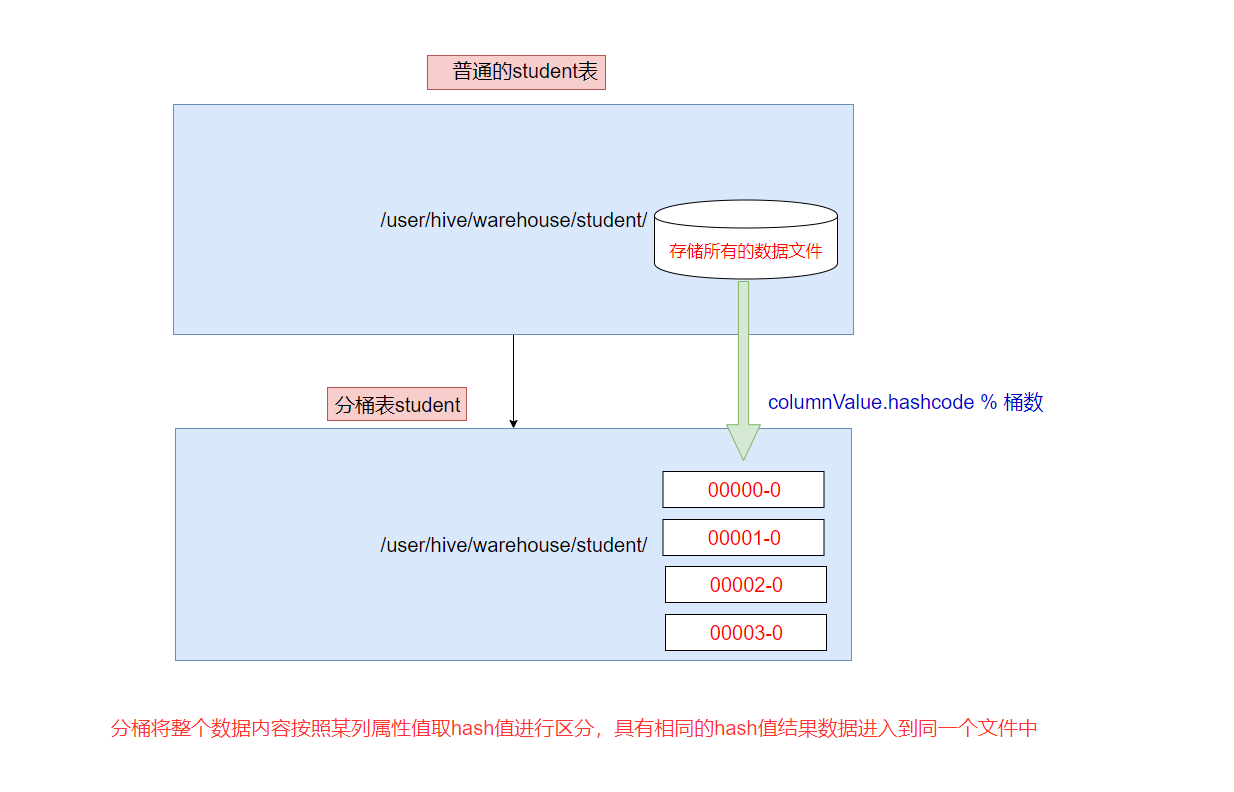hive基础知识二
1.1 hive的分区表的概念
在文件系统上建立文件夹,把表的数据放在不同文件夹下面,加快查询速度。

1.2 hive分区表的构建
-
创建一个分区字段的分区表
hive> create table student_partition1( id int, name string, age int) partitioned by (dt string) row format delimited fields terminated by '\t';
-
创建二级分区表
hive> create table student_partition2( id int, name string, age int) partitioned by (month string, day string) row format delimited fields terminated by '\t';
2、Hive修改表结构
2.1 修改表的名称
hive> alter table student_partition1 rename to student_partition3;
2.2 表的结构信息
hive> desc student_partition3; hive> desc formatted student_partition3;
2.3 增加/修改/替换列信息
-
增加列
hive> alter table student_partition3 add columns(address string);
-
修改列
hive> alter table student_partition3 change column address address_id int;
-
替换列
hive> alter table student_partition3 replace columns(deptno string, dname string, loc string); #表示替换表中所有的字段
2.4 增加/删除/查看分区
-
添加分区
//添加单个分区 hive> alter table student_partition1 add partition(dt='20170601') ; //添加多个分区 hive> alter table student_partition1 add partition(dt='20190818') partition(dt='20190819');

-
删除分区
hive> alter table student_partition1 drop partition (dt='20170601'); hive> alter table student_partition1 drop partition (dt='20170602'),partition (dt='20170603');
-
查看分区
hive> show partitions student_partition1;
3. Hive数据导入
3.1 向表中加载数据(load)
-
语法
hive> load data [local] inpath 'dataPath' overwrite | into table student [partition (partcol1=val1,…)];
load data: 表示加载数据
==local==: 表示从本地加载数据到hive表;否则从HDFS加载数据到hive表
inpath: 表示加载数据的路径
overwrite: 表示覆盖表中已有数据,否则表示追加
into table: 表示加载到哪张表
student: 表示具体的表
partition: 表示上传到指定分区
说明:load data ...本质,就是将dataPath文件上传到hdfs的 ‘/user/hive/warehouse/tablename’ 下。
实质:hdfs dfs -put /opt/student1.txt /user/hive/warehouse/student1
例如: --普通表: load data local inpath '/opt/bigdata/data/person.txt' into table person --分区表: load data local inpath '/opt/bigdata/data/person.txt' into table student_partition1 partition(dt="20190505") --查询表: select * from student_partition1 where dt='20190818'; --实操案例: 实现创建一张表,然后把本地的数据文件上传到hdfs上,最后把数据文件加载到hive表中
3.2 通过查询语句向表中插入数据(insert)
-
从指定的表中查询数据结果数据然后插入到目标表中
-
语法
-
insert into/overwrite table tableName select xxxx from tableName insert into table student_partition1 partition(dt="2019-07-08") select * from student1;
3.3 查询语句中创建表并加载数据(as select)
-
在查询语句时先创建表,然后进行数据加载
-
语法
-
create table if not exists tableName as select id, name from tableName;
3.4 创建表时通过location指定加载数据路径
-
创建表,并指定在hdfs上的位置
create table if not exists student1( id int, name string) row format delimited fields terminated by '\t' location '/user/hive/warehouse/student1';
-
上传数据文件到hdfs上对应的目录中
hdfs dfs -put /opt/student1.txt /user/hive/warehouse/student1
3.5 Import数据到指定Hive表中
注意:先用export导出后,再将数据导入。
create table student2 like student1; export table student1 to '/export/student1'; import table student2 from '/export/student1';
4、Hive数据导出(15分钟)
4.1 insert 导出
-
1、将查询的结果导出到本地
insert overwrite local directory '/opt/bigdata/export/student' select * from student; 默认分隔符'\001'
-
2、将查询的结果格式化导出到本地
insert overwrite local directory '/opt/bigdata/export/student' row format delimited fields terminated by ',' select * from student;
-
3、将查询的结果导出到HDFS上(没有local)
insert overwrite directory '/export/student' row format delimited fields terminated by ',' select * from student;
4.2 Hadoop命令导出到本地
hdfs dfs -get /user/hive/warehouse/student/student.txt /opt/bigdata/data
4.3 Hive Shell 命令导出
-
基本语法:
-
hive -e "sql语句" > file
-
hive -f sql文件 > file
bin/hive -e 'select * from default.student;' > /opt/bigdata/data/student1.txt
-
4.4 export导出到HDFS上
export table default.student to '/user/hive/warehouse/export/student1';
5、hive的静态分区和动态分区
5.1 静态分区
-
表的分区字段的值需要开发人员手动给定
-
1、创建分区表
create table order_partition( order_number string, order_price double, order_time string ) partitioned BY(month string) row format delimited fields terminated by '\t';
-
2、准备数据 order_created.txt内容如下
-
10001 100 2019-03-02 10002 200 2019-03-02 10003 300 2019-03-02 10004 400 2019-03-03 10005 500 2019-03-03 10006 600 2019-03-03 10007 700 2019-03-04 10008 800 2019-03-04 10009 900 2019-03-04
-
3、加载数据到分区表
load data local inpath '/opt/bigdata/data/order_created.txt' overwrite into table order_partition partition(month='2019-03');
-
4、查询结果数据
select * from order_partition where month='2019-03'; 结果为: 10001 100.0 2019-03-02 2019-03 10002 200.0 2019-03-02 2019-03 10003 300.0 2019-03-02 2019-03 10004 400.0 2019-03-03 2019-03 10005 500.0 2019-03-03 2019-03 10006 600.0 2019-03-03 2019-03 10007 700.0 2019-03-04 2019-03 10008 800.0 2019-03-04 2019-03 10009 900.0 2019-03-04 2019-03
5.2 动态分区
-
按照需求实现把数据自动导入到表的不同分区中,不需要手动指定
-
需求:按照不同部门作为分区导数据到目标表
-
1、创建表
--创建普通表 create table t_order( order_number string, order_price double, order_time string )row format delimited fields terminated by '\t'; --创建目标分区表 create table order_dynamic_partition( order_number string, order_price double )partitioned BY(order_time string) row format delimited fields terminated by '\t';
-
2、准备数据 order_created.txt内容如下
10001 100 2019-03-02 10002 200 2019-03-02 10003 300 2019-03-02 10004 400 2019-03-03 10005 500 2019-03-03 10006 600 2019-03-03 10007 700 2019-03-04 10008 800 2019-03-04 10009 900 2019-03-04
-
3、向普通表t_order加载数据
load data local inpath '/opt/bigdata/data/order_created.txt' overwrite into table t_order;
-
4、动态加载数据到分区表中
---要想进行动态分区,需要设置参数 hive> set hive.exec.dynamic.partition=true; //使用动态分区 hive> set hive.exec.dynamic.partition.mode=nonstrict; //非严格模式 insert into table order_dynamic_partition partition(order_time) select order_number,order_price,order_time from t_order; --注意字段查询的顺序,分区字段放在最后面。否则数据会有问题。
-
5、查看分区
show partitions order_dynamic_partition;
-
-

6、分桶
hive的分桶表

-
分桶是相对分区进行更细粒度的划分。
-
分桶将整个数据内容安装某列属性值取hash值进行区分,具有相同hash值的数据进入到同一个文件中
-
比如按照name属性分为4个桶,就是对name属性值的hash值对4取摸,按照取模结果对数据分桶。
-
取模结果为0的数据记录存放到一个文件
-
取模结果为1的数据记录存放到一个文件
-
取模结果为2的数据记录存放到一个文件
-
取模结果为3的数据记录存放到一个文件
-
-
-
作用
-
1、取样sampling更高效。没有分区的话需要扫描整个数据集。
-
2、提升某些查询操作效率,例如map side join
-
-
案例演示
-
1、创建分桶表
-
在创建分桶表之前要执行命名
-
set hive.enforce.bucketing=true;开启对分桶表的支持
-
set mapreduce.job.reduces=4; 设置与桶相同的reduce个数(默认只有一个reduce)
-
--分桶表 create table user_buckets_demo(id int, name string) clustered by(id) into 4 buckets row format delimited fields terminated by '\t'; --普通表 create table user_demo(id int, name string) row format delimited fields terminated by '\t';
-
-
2、准备数据文件 buckets.txt
1 laowang1 2 laowang2 3 laowang3 4 laowang4 5 laowang5 6 laowang6 7 laowang7 8 laowang8 9 laowang9 10 laowang10
-
3、加载数据到普通表 user_demo 中
load data local inpath '/opt/bigdata/data/buckets.txt' into table user_demo;
-
4、加载数据到桶表user_buckets_demo中
insert into table user_buckets_demo select * from user_demo;
-
-
5、hdfs上查看表的数据目录

-
6、抽样查询桶表的数据
-
tablesample抽样语句,语法:tablesample(bucket x out of y)
-
x表示从第几个桶开始取数据
-
y表示桶数的倍数,一共需要从 桶数/y 个桶中取数据
-
-
select * from user_buckets_demo tablesample(bucket 1 out of 2) -- 需要的总桶数=4/2=2个 -- 先从第1个桶中取出数据 -- 再从第1+2=3个桶中取出数据




 浙公网安备 33010602011771号
浙公网安备 33010602011771号